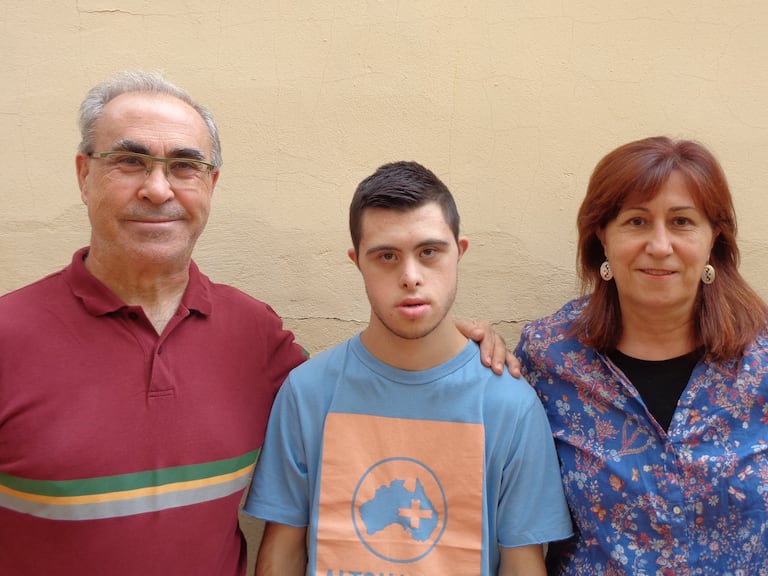Rubén Calleja, between his parents, this Sunday.
The United Nations (UN) Committee on the Rights of Persons with Disabilities has concluded that Spain violated the rights to an inclusive education and not to be discriminated against by Rubén Calleja, a young man with Down syndrome who when he was 11 years old was forced, against At the discretion of his family, to leave the ordinary public school in León where he was studying primary school and to enroll in a special education center.
The Government recovers the legal reform that eliminates the judicial incapacitation of people with disabilities
“It is harder for people with disabilities to come out of the closet.
We are treated in a worse way "
The opinion comes with an educational reform underway in Spain that proposes changes in the medium term in the schooling of children with disabilities.
And that has been criticized both by the sector of special education centers, which defends its maintenance, as well as by organizations of people with disabilities, who demand the rapid disappearance of this type of schools, in line with what the committee of the UN.
Some 35,000 students, around 17% of all Spanish students with disabilities, now attend special centers.
In its resolution on the case of Rubén Calleja, who is now 21 years old, the committee reproaches Spain for "making little progress in terms of inclusive education," and urges it to "adopt measures to prevent similar violations from being committed in the future ”, as well as to eliminate“ all educational segregation of students with disabilities ”, both in special education centers and in“ specialized units within ordinary schools ”.
Compensation
The opinion, which is mandatory, concludes that Spain must provide "effective reparation" for the expenses incurred by the family, trying to get the educational Administration of Castilla y León to rectify, and pay compensation ―which does not quantify, therefore it will probably have to be determined by the courts - "the emotional and psychological damages" suffered by Rubén and his parents throughout the process.
As it did in 2018, when it issued a harsh report on the country's compliance with the Convention on the Rights of Persons with Disabilities, signed by Spain in 2008, the committee urges the country to make educational centers "reasonable adjustments ”So that students with disabilities can complete their training in ordinary schools and institutes without having to change schools.
Seven years of struggle
Alejandro Calleja, the father of the young man, celebrated on Monday the decision of the United Nations body.
“We have spent seven years fighting for the rights and dignity of Rubén and until now all our petitions before the judicial authorities have been rejected.
What cannot be is that after eight years of perfectly schooled and integrated into a public school, the González de Lama de León, a teacher arrives and tells you that he does not want your son in his class.
And that all the work that we had carried out and everything that we had done as a whole in the educational community collapsed, "says Calleja by phone.
Parents, accused
According to the reconstruction carried out by the UN committee of what happened since 2009, the problems of Rubén and his family were not limited to their exclusion from ordinary school.
The parents reported to the prosecution that their son had allegedly suffered abuse at school by two teachers, but the matter was closed.
Some time later it was the León Juvenile Prosecutor's Office who denounced the parents for alleged family abandonment, the crime with which school absenteeism is persecuted.
The reason was that the parents refused to take their son to the special education center that the Junta de Castilla y León had assigned them.
This complaint was also filed by a court in León in 2015. That process, says Calleja, involved "a tremendous cost, financial but above all emotional."
After a period of allegations in which, on the one hand, the family, who reported the case to the committee in 2017, and on the other, the State Attorney have participated, the United Nations body reaches the conclusion that the The complaint of abuse against the child made by the parents was not sufficiently investigated, and Spain is urged to do so.
And it also requires the State to "ensure that parents of students with disabilities cannot be criminally prosecuted for the crime of family abandonment for demanding the right of their children to an inclusive education under equal conditions."
The new law
The draft reform of the educational law, the Lomloe, contemplates in its fourth additional provision that within a period of 10 years ordinary centers must have "the necessary resources to be able to serve students with disabilities in the best conditions," according to with the provisions of the "United Nations Convention on the Rights of Persons with Disabilities".
The norm does not foresee the disappearance of special education centers, but it does configure a new model in which these, as has happened in other countries, limit themselves to welcoming those "students who require highly specialized attention" (for example, medical nature) and perform at the same time “the function of reference and support centers for ordinary centers”.
The forecast has generated the rejection of the special education sector, in which public centers, subsidized centers ―promoted largely by relatives of people with disabilities and non-profit organizations―, and private centers, which defend the survival of the current model.
The regulation that is being processed in Congress has also received criticism from organizations of people with disabilities, such as Solcom, which was the first to denounce Spain before the United Nations Committee on the Rights of People with Disabilities.
These, on the opposite flank, regret that the bill proposes a horizon of a decade and in the meantime maintains a double network that the UN considers discriminatory.
Follow EL PAÍS EDUCACIÓN on
or
Sign up for the
EL PAÍS Education Newsletter

